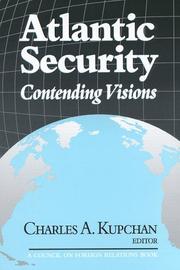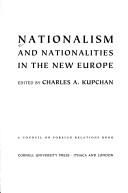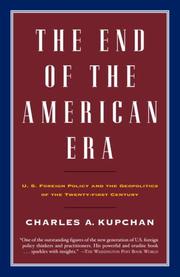| Listing 1 - 10 of 24 | << page >> |
Sort by
|

ISBN: 0876092350 Year: 1998 Publisher: New York, NY [Washington, DC] Council on Foreign Relations Press Distributed by Brookings Institution Press
Abstract | Keywords | Export | Availability | Bookmark
 Loading...
Loading...Choose an application
- Reference Manager
- EndNote
- RefWorks (Direct export to RefWorks)
National security --- Sécurité nationale --- Europe --- Politics and government --- Politique et gouvernement --- Sécurité nationale --- North America --- 1989 --- -National security
Book
ISBN: 9780691142654 0691142653 0691154384 9786612531514 1282531514 1400834414 9780691154381 Year: 2010 Publisher: Princeton Princeton University Press
Abstract | Keywords | Export | Availability | Bookmark
 Loading...
Loading...Choose an application
- Reference Manager
- EndNote
- RefWorks (Direct export to RefWorks)
Is the world destined to suffer endless cycles of conflict and war? Can rival nations become partners and establish a lasting and stable peace? How Enemies Become Friends provides a bold and innovative account of how nations escape geopolitical competition and replace hostility with friendship. Through compelling analysis and rich historical examples that span the globe and range from the thirteenth century through the present, foreign policy expert Charles Kupchan explores how adversaries can transform enmity into amity--and he exposes prevalent myths about the causes of peace.Kupchan contends that diplomatic engagement with rivals, far from being appeasement, is critical to rapprochement between adversaries. Diplomacy, not economic interdependence, is the currency of peace; concessions and strategic accommodation promote the mutual trust needed to build an international society. The nature of regimes matters much less than commonly thought: countries, including the United States, should deal with other states based on their foreign policy behavior rather than on whether they are democracies. Kupchan demonstrates that similar social orders and similar ethnicities, races, or religions help nations achieve stable peace. He considers many historical successes and failures, including the onset of friendship between the United States and Great Britain in the early twentieth century, the Concert of Europe, which preserved peace after 1815 but collapsed following revolutions in 1848, and the remarkably close partnership of the Soviet Union and China in the 1950s, which descended into open rivalry by the 1960s.In a world where conflict among nations seems inescapable, How Enemies Become Friends offers critical insights for building lasting peace.Bron : http://press.princeton.edu
Peaceful change (International relations) --- Peace-building. --- International relations --- World politics --- National security. --- Balance of power. --- Transformations pacifiques (Relations internationales) --- Consolidation de la paix --- Relations internationales --- Politique mondiale --- Sécurité nationale --- Equilibre des puissances --- History --- Histoire --- #SBIB:327.5H20 --- 823 Diplomatie --- 827 Geopolitiek --- Vredesonderzoek: algemeen --- 827 GeopolitiekVredesonderzoek: algemeen --- Peaceful change (International relations). --- Sécurité nationale --- Balance of power --- National security --- Peace-building --- Peace --- Building peace --- Peacebuilding --- Conflict management --- Peacekeeping forces --- National security policy --- NSP (National security policy) --- Security policy, National --- Economic policy --- Military policy --- Power, Balance of --- Power politics --- Political realism --- Government policy --- International relations - History - 21st century --- World politics - 21st century --- Politiek --- Buitenlandse politiek --- Diplomatie --- Oorlog --- Vredesproblematiek
Book
ISBN: 9780199739394 0199739390 Year: 2012 Publisher: Oxford Oxford University Press
Abstract | Keywords | Export | Availability | Bookmark
 Loading...
Loading...Choose an application
- Reference Manager
- EndNote
- RefWorks (Direct export to RefWorks)
The world is on the cusp of a global turn. Between 1500 and 1800, the West sprinted ahead of other centers of power in Asia and the Middle East. Europe and the United States have dominated the world since. But today the West's preeminence is slipping away as China, India, Brazil and other emerging powers rise. Although most strategists recognize that the dominance of the West is on the wane, they are confident that its founding ideas--democracy, capitalism, and secular nationalism--will continue to spread, ensuring that the Western order will outlast its primacy. In No One's World, Charles A. Kupchan boldly challenges this view, arguing that the world is headed for political and ideological diversity; emerging powers will neither defer to the West's lead nor converge toward the Western way. The ascent of the West was the product of social and economic conditions unique to Europe and the United States. As other regions now rise, they are following their own paths to modernity and embracing their own conceptions of domestic and international order. Kupchan contends that the Western order will not be displaced by a new great power or dominant political model. The twenty-first century will not belong to America, China, Asia, or anyone else. It will be no one's world. For the first time in history, the world will be interdependent--but without a center of gravity or global guardian. More than simply diagnosing what lies ahead, Kupchan provides a detailed strategy for striking a bargain between the West and the rising rest by fashioning a new consensus on issues of legitimacy, sovereignty, and governance. Thoughtful, provocative, sweeping in scope, this work is nothing less than a global guidebook for the 21st century.Bron : http://www.amazon.com
Globalization. --- International relations. --- Political science. --- Developing countries --- Economic integration. --- Internationalisering --- Politiek --- Buitenlandse politiek --- Politieke theorieën --- 339.9 --- Internationale economie --- Globalization --- International relations --- Political science --- Administration --- Civil government --- Commonwealth, The --- Government --- Political theory --- Political thought --- Politics --- Science, Political --- Social sciences --- State, The --- Coexistence --- Foreign affairs --- Foreign policy --- Foreign relations --- Global governance --- Interdependence of nations --- International affairs --- Peaceful coexistence --- World order --- National security --- Sovereignty --- World politics --- Global cities --- Globalisation --- Internationalization --- Anti-globalization movement --- Politieke theorie --- Maatschappij --- Film
Book
ISBN: 9054665149 9789054665144 Year: 2003 Volume: *7 Publisher: Amsterdam : Byblos,
Abstract | Keywords | Export | Availability | Bookmark
 Loading...
Loading...Choose an application
- Reference Manager
- EndNote
- RefWorks (Direct export to RefWorks)
Etats-Unis politique --- Geopolitiek --- Géopolitique --- Verenigde Staten politiek --- #KVHA:Politiek; Verenigde Staten --- 327 <73> --- 327 <73> Buitenlandse betrekkingen. Buitenlandse politiek. Internationale betrekkingen. Internationale politiek. Wereldpolitiek--Verenigde Staten van Amerika. VSA. USA --- Buitenlandse betrekkingen. Buitenlandse politiek. Internationale betrekkingen. Internationale politiek. Wereldpolitiek--Verenigde Staten van Amerika. VSA. USA --- International relations. Foreign policy --- United States --- United States of America --- Verenigde Staten ; politiek
Book
ISBN: 9780415610544 9780203832127 9781136834080 9781136834127 9781136834134 0203832124 0415610540 Year: 2011 Volume: 30 Publisher: London ; New York Routledge
Abstract | Keywords | Export | Availability | Bookmark
 Loading...
Loading...Choose an application
- Reference Manager
- EndNote
- RefWorks (Direct export to RefWorks)

ISBN: 0801482763 080143162X Year: 1995 Publisher: Ithaca (N.Y.) : Cornell university press,
Abstract | Keywords | Export | Availability | Bookmark
 Loading...
Loading...Choose an application
- Reference Manager
- EndNote
- RefWorks (Direct export to RefWorks)
Tien essays over de heropleving van het nationalisme in het nieuwe Europa na de Koude Oorlog. Naast een aantal theoretische bijdragen over nationalisme wordt ook een vergelijking getrokken tussen nationalisme in West- en Oost-Europa en wordt ruim aandacht besteed aan de ondertussen klassieke gevallen van nationalistische brandhaarden in de voormalige Sovjet-Unie, de Balkan en ex-Joegoslavië. Ook is er een bijdrage rond nationalisme als oorzaak van oorlog maar tegelijkertijd wordt ook benadrukt dat de geschiedenis ook leert dat nationalisme vaak een positieve, integrerende rol heeft gespeeld. Tot slot worden een aantal conclusies getrokken naar het Amerikaanse beleid ten aanzien van Europa.
Europe --- Nationalism --- Council of Europe countries --- Eastern Hemisphere --- Eurasia --- Politics and government --- Congresses. --- History --- 812 Ideologie --- 841 Politiek Bestel --- 846 Identiteit --- 855 Oorlogsvoering --- 884.1 Oost-Europa --- 884.3 Zuid-Europa --- 884.4 West-Europa --- 884 Europa

ISBN: 0375726594 0375412158 9780375726590 9780375412158 Year: 2002 Publisher: New York (N.Y.) : Knopf,
Abstract | Keywords | Export | Availability | Bookmark
 Loading...
Loading...Choose an application
- Reference Manager
- EndNote
- RefWorks (Direct export to RefWorks)
United States --- Etats-Unis --- Foreign relations. --- Foreign relations --- Relations extérieures --- 1989 --- -United States --- -#KVHA:American Studies --- #KVHA:Politiek; Verenigde Staten --- #A0507PO --- #SBIB:327H15 --- Buitenlandse politiek: Noord-Amerika --- #KVHA:American Studies
Book
ISBN: 9780199393022 9780197642610 9780199393251 Year: 2022 Publisher: New York, N.Y. Oxford University Press
Abstract | Keywords | Export | Availability | Bookmark
 Loading...
Loading...Choose an application
- Reference Manager
- EndNote
- RefWorks (Direct export to RefWorks)
"The United States is in the midst of a bruising debate about its role in the world. Not since the interwar era have Americans been so divided over the scope and nature of their engagement abroad. President Donald Trump's America First approach to foreign policy certainly amplified the controversy. His isolationist, unilateralist, protectionist, and anti-immigrant proclivities marked a sharp break with the brand of internationalism that the country had embraced since World War II. But Trump's election was a symptom as much as a cause of the nation's rethink of its approach to the world. Decades of war in the Middle East with little to show for it, rising inequality and the hollowing out of the nation's manufacturing sector, political paralysis over how to fix a dysfunctional immigration policy--these and other trends have been causing Americans to ask legitimate questions about whether U.S. grand strategy has been working to their benefit. Adding to the urgent and passionate nature of this conversation is China's rise and the threat it poses to the liberal international order that took shape during the era of the West's material and ideological dominance. Isolationism speaks directly to this unfolding debate over the future of the nation's engagement with the world. It does so primarily by looking back, by probing America's isolationist past. Although most Americans know little about it, the United States in fact has an impressive isolationist pedigree. In his Farewell Address of 1796, President George Washington set the young nation on a clear course: "It is our true policy to steer clear of permanent alliances with any portion of the foreign world." The isolationist impulse embraced by Washington and the other Founders guided the nation for much of its history prior to the Japanese attack on Pearl Harbor in 1941"--
Isolationism --- History. --- United States --- Foreign relations. --- USA--FOREIGN RELATIONS--HISTORY --- ISOLATIONISM--USA--HISTORY --- International relations. Foreign policy --- United States of America
Book
ISBN: 0044970579 Year: 1987 Publisher: Boston Allen and Unwin
Abstract | Keywords | Export | Availability | Bookmark
 Loading...
Loading...Choose an application
- Reference Manager
- EndNote
- RefWorks (Direct export to RefWorks)
National security --- United States. --- NATO. --- Europe --- United States --- Military policy.
Book
ISBN: 0801428858 Year: 1994 Publisher: Ithaca Cornell University Press
Abstract | Keywords | Export | Availability | Bookmark
 Loading...
Loading...Choose an application
- Reference Manager
- EndNote
- RefWorks (Direct export to RefWorks)
| Listing 1 - 10 of 24 | << page >> |
Sort by
|

 Search
Search Feedback
Feedback About UniCat
About UniCat  Help
Help News
News